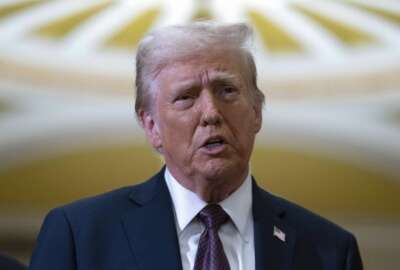Federal Drive interviews – Oct. 26
How would the Pentagon change under Mitt Romney? And what would President Obama do to the Defense Department in a second term? Federal Drives talks to advisers to...
How would the Pentagon change under Mitt Romney? And what would President Obama do to the Defense Department in a second term? The Federal Drive spoke with two long-time Pentagon insiders now advising the presidential candidates on national security.
 Michele Flournoy — Co-chair, Obama for America National Security Advisory Board
Michele Flournoy — Co-chair, Obama for America National Security Advisory Board
|
|
Flournoy was, until recently, the Under Secretary of Defense for Policy. She outlines how President Obama has made his mark on the Defense Department, as well as the biggest challenges ahead for defense policy.
 Dov Zakheim — Former Under Secretary of Defense and Pentagon Comptroller in George W. Bush Administration
Dov Zakheim — Former Under Secretary of Defense and Pentagon Comptroller in George W. Bush Administration
|
|
Zakheim is advising the Romney campaign. He discusses the underlying defense policy that would drive a Romney administration’s actions. He also discusses how Romney’s defense secretary would deal with procurement reforms at the Defense Department.
 BethAnn Telford — Special Events Coordinator, GPO & IRONMAN competitor
BethAnn Telford — Special Events Coordinator, GPO & IRONMAN competitor
|
|
BethAnn Telford says she isn’t a cancer patient. She’s a cancer warrior. Case in point: Last week, this special events coordinator at the Government Printing Office completed the Ironman World Championship race in Kona, Hawaii — all while battling a brain tumor. That’s a 2.4 mile open-water swim, a 112-mile bike ride and a 26.2 mile run. She told the Federal Drive what she was thinking about during the race.
READ MORE: VIDEO: Battling brain cancer, GPO employee to compete in IRONMAN
 Air Force Brig. Gen. John Michel
Air Force Brig. Gen. John Michel
|
|
U.S. Transportation Command moves pretty much everything the military uses — from food to fuel to people. And now that the military is embarking on a major transition from war to peace…and from the Middle East to other regions of the world. TRANSCOM is changing too. It just released a five-year strategy. Michel says it’s the most comprehensive strategic planning effort in TRANSCOM’s 25 years.
Steven Martin — Information Assurance Manager, Military Satellite Communications, Air Force
|
|
The Defense Department recently told its IT staff to apply a popular off-the-shelf cybersecurity-monitoring tool to its networks. That’s not easy when that network is a one-of-a-kind. Martin certifies space and ground communications networks used by warfighters and the president.
MORE FROM THE FEDERAL DRIVE
Panel discussion: Industry, government find common ground in cyber realm
Panelists are Scott Algeier, executive director of the Information Technology – Information Sharing and Analysis Center (IT-ISAC) and vice chairman of the National Council of ISACs, and Jason Miller, executive editor of Federal News Radio. They discuss the sorts of collaborative efforts happening at the ground level between government and industry to share data and exchange best practices on cyber.
DoD Report
Defense Secretary Leon Panetta has a message for Congress: Get to work. Panetta, a former congressman, is urging lawmakers to knuckle down to the hard work of avoiding sequestration. Congress won’t return until after the election, when it holds a lame-duck session. Panetta wants Congress to pass a permanent budget to replace the six-month continuing resolution the government is operating under now. And he wants to see a Defense authorization bill as well as passage of a stalled cybersecurity bill. Unless it acts to avoid sequestration, the Pentagon will face budget cuts of around $50 billion come Jan. 2. (Federal News Radio)
“You don’t deploy forces into harm’s way without knowing what’s going on.” Defense Secretary Leon Panetta says that’s why the military did not move quickly into Benghazi when the U.S. consulate there was attacked. He says service members were in the area and ready to respond. But leaders lacked real-time information. The attack lasted just a few hours. Panetta says it was over before the Pentagon really knew what was happening. Joint Chiefs of Staff Chairman Martin Dempsey says troops in the area were on heightened alert because it was Sept. 11. But,he says, it was Sept. 11 everywhere in the world. Dempsey says the Defense Department is studying the attack and surrounding circumstances. At this point, he says, it isn’t helpful to provide partial answers. The two men addressed reporters at the Pentagon yesterday. (Federal News Radio)
Cybersecurity Update
Copyright © 2025 Federal News Network. All rights reserved. This website is not intended for users located within the European Economic Area.





